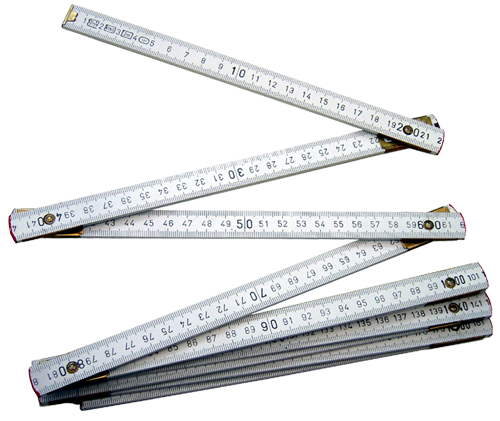 |
| Za. "Metre pliant" via wikimedia, 10/05/01. CCO Attribution Share Alike. |
The rewritten section is obviously quite a bit shorter, but is also easier to read through with a quick glance. You get the point of the paragraph much quicker than my original draft, and it still has all of the sources included.
One of the issues with this shortened style is that it skips over much of the emphasis I include in the original paragraph, and therefore you don't get the sense of magnitude for some of the points I make, such as how important reusable rockets are, compared to the original paragraph.
Also the revised paragraphs seem to miss some of the easy to flow through transitions that make sentences work together. Other than that both of the paragraphs deliver the same message and could work.
My original excerpt: "Meg Urry, an American astrophysicist and President of the American Astronomical Society, in her article on CNN shows the optimism that many interested or invested public workers see with the opportunity of private space companies launching rockets into space along with the support of NASA. Urry, writing before the first successes of SpaceX in 2012, sees the program as a new lease on life for exploration within NASA. This same optimism is shared by Calla Cofield, a writer for Space.com, when she shares the success of Blue Origin’s reusable rocket landing the day before on November 23rd, 2015. Rather than feeling hopeful for NASA’s freedom to explore, Cofield is excited for the new innovation private companies competition will bring to space travel, as this feat of landing a launched rocket back on the ground could mean a large reduction in refurbishment costs for rockets. Other companies like SpaceX, are also attempting to create landing rockets, although with less success so far, after four failed attempts. Scott Simon, in an NPR interview with John Glenn Brenner, a writer of a book on SpaceShipOne, an attempt at a space plane by Virgin Galactic, another entrepreneurial investing in space travel, discusses the dangers of space travel after the breakup of SpaceShipOne during a flight test just the day before the interview. Discussions like this one, often highlight the cautious side of the public, rather than simple optimism, and view the dangers of space as being very present and real, and show concern with the cost reduction measures and rapid time table that private companies have brought products to space."
After revision: "American astrophysicist Meg Urry’s CNN article shows the optimism that interested public workers see with the opportunity of private space companies launching rockets with the support of NASA. Urry, President of the American Astronomical Society, saw the program as a new lease on life for exploration within NASA, even before SpaceX’s launch successes in 2012. Calla Cofield, a writer for Space.com, shares this optimism by writing just after the success of Blue Origin’s reusable rocket landing on November 23rd, 2015. Cofield is excited for the new innovation competitive private companies will bring to space travel, as reusable rockets could mean a large reduction in refurbishment costs for rockets. Other companies like SpaceX, have also unsuccessfully attempting to create landing rockets, failing four times so far. Scott Simon’s NPR interview with John Gleen Brenner, a writer on a book on SpaceShipOne, discusses the danger of space travel, as SpaceShipOne, a space plane from private company Virgin Galactic, broke up during a flight test just before the interview. Discussions like this one highlight the present danger of space travel, which could be further enhanced by cost and time reduction measures by private companies."
No comments:
Post a Comment